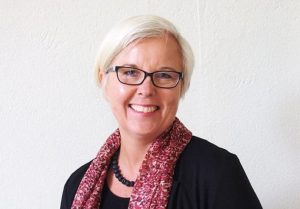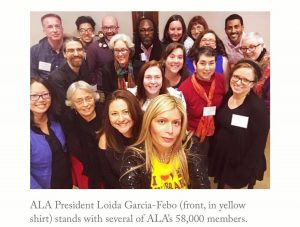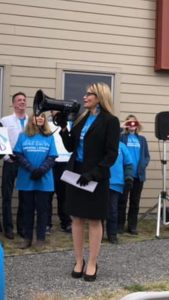Colleagues, we are excited to announce the our third episode of the CPDWL Podcast Project where we feature library and information professionals who support and participate in professional development work.
Our guest is Susan Schnuer. Susan Schnuer is the Public Library Innovation Programme Capacity Building Manager for EIFL. Her responsibilities include working with library authorities in Africa on institutionalizing continuous professional development for public librarians, in the past year she has worked mainly in Kenya and Namibia. Before joining EIFL in 2018, Susan was the Associate Director at the Mortenson Center for International Library Programs, located at the University of Illinois. For more than 25 years Susan created and implemented high-quality professional development programmes for librarians world-wide. Susan received multiple grants that allowed her to focus on specific regional library needs. Working with local partners, she implemented successful and sustainable library projects in countries such as Costa Rica, Ghana, Haiti, Nigeria, Tanzania, and Uganda.
Most recently Susan has been focused on the development of library leadership materials for public libraries. Supported by the Bill & Melinda Gates Foundation, the project Strengthening Innovative Library Leaders (SILL) is a freely-available training programme designed to build leadership and innovation skills for anyone who works in a public library. The training materials were co-developed with librarians from Armenia, Bhutan, Haiti, India, Myanmar, Namibia, and Nepal. Susan has received numerous awards including the IFLA Scroll of Appreciation and the John Ames Humphry/OCLC Forest Press Award for International Librarianship. Susan has a Bachelor’s degree from Tufts University, an education postgraduate degree from Boston University, and a library postgraduate degree from the University of Illinois, USA.
See here for the podcast conversation!
Transcript
Ray:
Hi, this is Ray Pun. Welcome to the CPDWL podcast project! In this space we talk with library and information professionals who support and participate in professional development work. Today’s guest is Susan Schnuer, Public Library Innovation Program Capacity Building Manager for EIFL. Her responsibilities include working with library authorities and Africa on institutionalizing continuous professional development for public librarians. In the past year. She has worked mainly in Kenya and Namibia. Before joining EIFL in 2018, Susan was the associate director of the Mortenson Center for International library programs, located at the University of Illinois. For more than 25 years. Susan created and implemented, high quality professional development programs for librarians worldwide. She received multiple awards and grants that allowed her to focus on specific regional library needs, working with local partners, she implemented successful and sustainable library projects in countries such as Costa Rica, Ghana, Haiti, Nigeria, Tanzania and Uganda. Welcome, Susan!
Susan:
Thank you for having me, Ray.
Ray:
So before we begin, there are actually a couple of questions I should have asked before which is mindful, can you tell us what it stands for.
Susan:
EIFL stands for electronic information for libraries, it’s a nonprofit that’s located in Lithuania, and its motto is knowledge without boundaries.
Ray:
Great. And we know for a fact that a fun fact is that you are always traveling as I read in your bio, can you tell us where you’re located right now?
Susan:
Actually I’m back in the United States right now which is great because I’ve had about eight international trips this year so it’s fun to be home.
Ray:
That’s nice. So we’re going to have this conversation with you, and we’re really interested to hear about your experiences as I described, and for yourself. We’re curious to hear if you had to describe yourself using only one word, what word would that be?
Susan:
Well, my grandchildren would say that I’m fun, but in a professional setting probably the word that I would use to describe myself is perceptive. And this is a quality that I developed from my upbringing where I was raised in France Peru and Mexico, and also from the work that I’m currently doing internationally. I’ve learned how to understand both verbal and nonverbal communication in complexity.
Ray:
Wow. That’s interesting that you were born grew up in different areas that that I didn’t know. So, it might explain a little bit about your current work but we’re really curious what compelled you to become a librarian. How did you get started?
Susan:
I didn’t start on the path of librarianship I started as a bilingual elementary teacher and then I stopped school years to to be at home with the children, and when I thought about rescheduling I was thinking about well what should I do, where do I want to go, and a friend suggested that I become a librarian. I agreed. And I thought I’d be a school librarian. However, when I graduated from the University of Illinois, a brand new center had opened, the Mortensen Center for International library programs. I applied and the rest, as they say, is history.
Ray:
So, with the work you’ve done at the Mortensen Center and and your current work. We’re really curious about also your vision or view for international librarianship, what does it mean to you and has that vision changed for you over time?
Susan:
For me international librarianship means understanding the global network that surrounds the work of libraries and librarians, or the players, what are the issues, what are the challenges. How do we work together to sustain and grow that global network. My thinking about working internationally has evolved a great deal over the years in developing and transitioning countries, 25 years ago I worked on the assumption that the international work was more of a one way highway from us to you. But now I’m a firm believer in co-partnership, co-creation and sustainability. The best work is the work that makes a change that leaves a very small footprint.
Ray:
Interesting and you started a lot of work at this law with our section and of course all the other groups, specifically, how did you get involved with CPDWL, and why did you work with this section, specifically for you?
Susan:
Actually and it says a lot about CPDWL. When I attended my first IFLA which was in Argentina in 2004. And I was really interested in continuing professional development, at that point, and so I visited all the different sections that were engaged with professional development and CPDWL was the only section that invited me to the table, and was interested in my opinions. And for me that was meant that that was a section. That’s where I wanted to be with people who had those kind of beliefs, and we’re willing to invite everybody to participate.
Ray:
And you were previously a co chair for the section, is that correct?
Susan:
Yes, actually I started the whole co-chair sort of activity in our section, I was first chair. But when I was thinking about it I really realized that first of all this was this was big work, but also we were not doing a good job of mentoring people on the section and in the community who might be interested in doing this work but were reluctant to take it on thinking it was, it was too much. So how to give them a chance to see the work up close and to figure out if there’s something that would be interesting in them so Ulrike Lang and I were the first ones to be co-chairs. We propose this to IFLA and they were not thrilled with our idea but now gained some popularity and I think this is a great way to proceed.
Ray:
Definitely, and your work as a satellite meeting chair right? You have your organized?
Susan:
Yes. And I have to say that it I think that’s some of the best CPDWL work is done in the satellite meetings where you really get a chance to delve into the topic, but you also get a chance to hear from different perspectives from people who might not have a chance to attend an IFLA but can come to a satellite meeting. I’ve just loved some of our satellite meetings, there are a ton of work, and they’re just of learning and richness and friendships and just lovely.
Ray:
Yeah, I totally agree. We were able to organize one this year in Zagreb, Croatia, and I was part of the planning group and it was quite a rewarding, but also great learning experience. And with that being said you had mentioned all the work within CPDWL and IFLA. Can you share with us a memorable moment you have with CPDWL or IFLA?
Susan:
I’m actually I’m going to share a funny moment that I’ve had with CPDWL at IFLA. And this was when I was running a CPDWL session for the IFLA Congress, and we had had extensive conversations in CPDWL about the fact that we no longer wanted to do sessions that were just about people reading papers or speaking one way to an audience. We wanted to host sessions where presenters would read, and talk and would be engaging and would have dialogue with the participants. So we decided on a roundtable approach, I can’t even remember exact topic, but we had several presenters and our participants would move to different tables every 15 to 20 minutes. This format had not been used at IFLA yet so we explained carefully to the IFLA conference organizers, that we would need several round tables mobile chairs, flexible space. In other words, what we got instead was an auditorium, with a stage, and some fixed seats, or initial panic, we reorganized and had different presenters in different parts of the auditorium. Some in the front of the stage, some at the back of the room. It was hard to use the chairs and most of the participants and the presenters just stood and talked. My role was to stand on the stage, explain what was happening and blow a whistle to let people know to move to another group there was time to move on. It was probably the most chaotic session that I’ve ever moderated, and yet at the end, numerous participants came up to me to say that was the best session that they have ever attended: engaging and interactive. And could we please continue to offer this session. So I think that was kind of a transformational moment for us in CPDWL that we needed to be presenting, new ways of offering knowledge to the participants of IFLA and not always do the same old traditional approach.
Ray:
Yeah, that’s actually a good point. And just to hear right you’ve been instrumental in making that happen because right now you can submit proposals under banquet roundtables, and now they actually have the roundtables.
Susan:
It was after that first sort of catastrophe that we had, then discuss more with IFLA headquarters. And I think the great point when they saw how popular this session was they understood that they needed to create the space for that.
Ray:
Yeah, and it’s great to have that variety. Some people might like papers and you know the roundtables just mix them up a little bit.
Susan:
Yes, exactly.
Ray:
So, what are you most excited about in the profession?
Susan:
I continue to be amazed at the work being done by some of our colleagues in low resource countries. There are some amazing organizations such as Read Global that works in India, Nepal, and Bhutan, and running projects for small enterprises for women in libraries are offering safe spaces for victims of sex trafficking. World Reader is another organization that works with publishers and authors to capture local materials and local languages load them on e-readers that are then distributed to public libraries and many countries. A librarian in Myanmar told me this last story that I wanted to mention. She noticed that they, there were a lot of street children in her town, and they did not have time to come to the library because they were spending their time collecting plastic bottles to sell in the marketplace. So she set up a table with tablets outside the library so that when they pass by the library. They could stop for a few minutes to read or play a game. There are many of these stories and they’re all inspirational.
Ray:
Wow, that’s really interesting to hear that kind of changes and challenges going on, and it does does make the profession pretty exciting. And so with the work you’ve done on providing professional development tips for many of the different groups you’ve supported, I’m really curious what’s a professional development tip or advice that you like to share with others listening?
Susan:
So my tip is this: make room at the table for all the voices. The wonder of using international setting is, is the beauty of all the different filters that we use to understand the world. However, in IFLA and in many international contexts where English is the dominant language, and a Western cultural approach is most prevalent, we can easily extinguish those voices that bring value and intelligence to our conversations. I’ve learned to listen, ask many questions and monitor off, when I’m speaking. Every time I speak I’m taking space, space that might bring another perspective, it’s important that our meetings and conversations are paced, so that everyone has a chance to speak, and we can see, full advantage of what it means to be truly global.
Ray:
Wow, very insightful. Um, this is a little bit different but I think people are probably curious, I’m definitely curious because of the work you’ve done, and I think I have an idea of what you might do but I’m curious what you would say, so what profession, other than librarianship, would you like to attempt?
Susan:
Hmm. I’m going to completely switch gears on you. I’ve thought of becoming a swim instructor for adults who have never learned how to swim. And I realized that I would love to do this when I was recently in Kenya, with colleagues at an ocean, and several women told me that they had never been either in the ocean, or a pool. And since we were in a location with both of those. We immediately started a little swim group. And they’re delighted and learning how to move in water was so rewarding I thought, “Boy, this is something I could see doing when I retired from my current position.”
Ray:
Oh, that’s nice. Yeah, I was a leading towards non-profit work, but I mean that’s sort of like similar advocacy level, work. And speaking about the work, you’re doing right now, what are you working on right now?
Susan:
So what I’m working on right now is making sort of changing the way that national libraries approach professional development building for their public librarians in Kenya and Namibia, and to do this, we’ve looked at what they’re currently doing what they’re currently doing is that they when they have resources, and they can bring in experts then they have training, but our idea was to build the expertise within the country, so that they wouldn’t need as much money, and they could also have the experts that they need right on site. And so I’ve been working in Kenya and Namibia with a group of cohorts of public librarians on developing their training skills, and also scaling them up in various areas, and it’s just been a great project in each country. I’ve been working in Kenya for 18 months in Namibia now for about a year. And I’ve been there, like four or five times every year and it really has been fun to work with a very amazing group of local librarians who are very excited about being trainers in their, in their local context so it’s just kind of fabulous.
Ray:
How exciting that you get to have this opportunity and it’s so great that you’re working globally and really supporting librarian local librarians there. And so with that being said, we know that it sounds like, and we know that you’re always somewhere, doing something really important and critical, and we appreciate that and so this is a final question here where can our listeners connect with you, online?
Susan:
One of the ways I do that especially with my colleagues in Kenya Namibia is on WhatsApp. So I am on WhatsApp, and easily accessible there, but also email, Facebook LinkedIn or other ways I can be, you can get my attention.
Ray:
Great. Well, I wanted to thank our listeners for hearing all the interesting things that Susan has presented and Thank you Susan, for joining us in this conversation!
Susan:
Thank you for having me, Ray! It’s been delightful!




